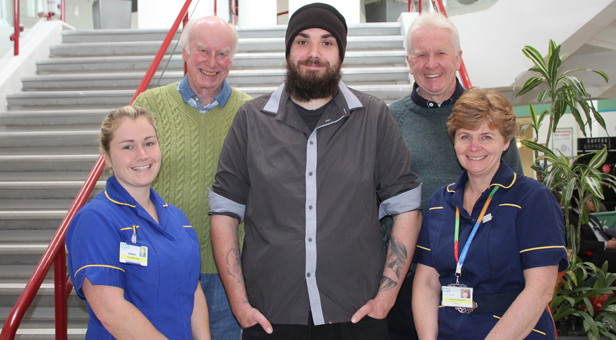
Front row (l-r) nurse Katharine Wade, IBD patient Carl Gauntlett, nurse Heather Johnson back row (l-r) IBD patient Trevor Lloyd and head of the IBD Patient Panel Bournemouth, Bill Howlett
An innovative new treatment for ulcerative colitis and Crohn’s disease has revolutionised care for patients at the Royal Bournemouth Hospital (RBH).
These types of Inflammatory Bowel Disease (IBD) affect the gastrointestinal tract, causing extreme bloating, abdominal pain, constipation and diarrhoea. ‘Azathioprine’ is widely prescribed to manage these symptoms, but more than half of patients stop taking the drug owing to side-effects. The alternative is an expensive biologic drug injection that isn’t always effective for long-term use.
However, a successful trial published by RBH’s Department of Gastroenterology means RBH patients are now receiving an oral treatment called ‘Allopurinol’ , which helps Azathioprine relieve the symptoms of IBD whilst blocking the pathway that causes side-effects. The drug can also be taken by patients at home in tablet form.
The new treatment not only improves the experience and quality of care of RBH patients, it also has huge cost saving implications for the NHS. By using a small dose of Azathioprine with Allopurinol, the Trust has saved more than £10,000 per patient per annum compared to the cost of switching to the more expensive biologic drug injections.
Bill Howlett, head of the IBD Patient Panel Bournemouth, said: “We are very pleased this treatment option is available for patients at the Royal Bournemouth Hospital. This combination of medication has not been universally recognised by other Trusts. Inflammatory Bowel Disease can have a drastic impact on a person’s life –many people living with IBD need to stay near a toilet all the time, so ordinary things such as going to work or taking part in hobbies and going on holiday can be severely affected. The more treatments there are available to help people cope with this debilitating condition, the better.”
Heather Johnson, IBD Nurse Specialist at RBH, said: “We are absolutely delighted with the successful trial of this new treatment plan. The trial is an example of what we in the NHS are striving to achieve: An improvement in the care and experience of our patients whilst also saving under financial pressures.
She went on to say: “As far as we are aware, we are one of very few hospitals adopting this approach and plan to keep researching the advantages to the benefit of all.”







When was this published? Would love to know how long this has been a thing!
Hi Artie, this article was published on 19 February 2016